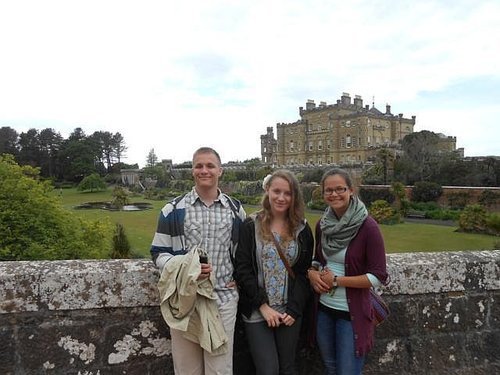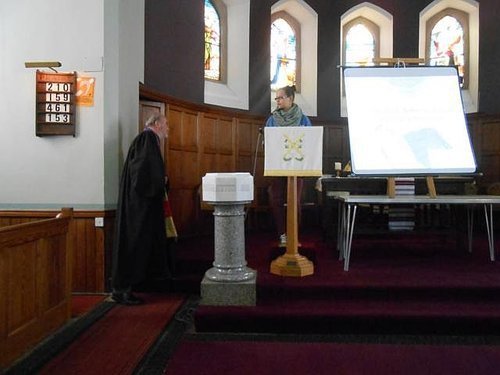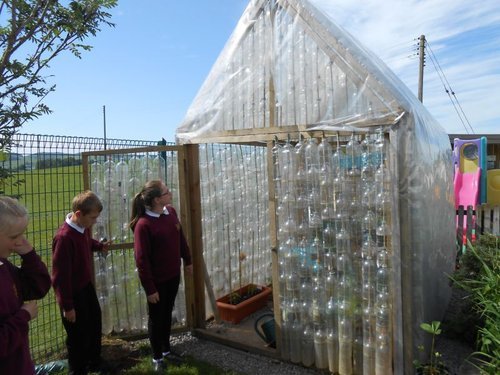Winners of the first National Creation Care Competition participated in a six-day study visit to Scotland. During the eventful trip, students of the Fasor Lutheran Secondary School had the opportunity to see the Scottish eco-congregation programme in action.
For the first time this year, a National Creation Care Competition was held in Hungary, the main prize of which was a study visit to Scotland. The travelling costs were covered by the Eco-Congregation Council of the Reformed Church in Hungary, while room and board were offered by the Scottish partner church. The chairman of the jury was Dr. András Victor, and Rev. Norman Hutcheson from Scotland, who organized the trip to Scotland, offered his church's hospitality and also quizzed the competitors.
The winner: Fasor Lutherans
Out of the five teams that made it to the final, the Fasor Lutheran Secondary School came first, with their creation action called Conservation and the Bible. What they did was organize an "eco-reception" in their school. Inspired by the Bible story of the feeding of the five thousand, they served roast fish and bread, while wine was replaced with elderflower syrup, and homemade soaps were available for washing hands. "We laid the tables ourselves, and then talked to those present about the significance of caring for creation. Then we read Matthew 6:41 out loud, expressed our gratitude to the Lord and sat down to eat," explained the competitors in their presentation.

The runner-up was the Reformed Youth Group of Hajdúnánás with a water protection project: "We called the attention of our fellow students to the importance of recycling, the indispensable nature of water, environmental consciousness and saving water, which determines our whole future," they summarized. The second prize, a summer holiday at Lake Balaton with full board, was offered by the Evangelical-Lutheran Church in Hungary. The rest of the finalists, who also made successful presentations, received book, film and toy prizes.
Scotland – here we come!
The winning team (consisting of Henrietta Andree, Eszter Varga and Noel Sólyom), accompanied by Boglárka Szűcs, Eco-Congregation coordinator, left for Edinburgh on Saturday, 15 July. The flight in itself was a great experience, as they could see from the air offshore drilling rigs, wind turbine farms as well as the fascinating terrain of Scotland. The Hungarian delegation was welcomed by the Scottish pastor and his wife, who took their guests for a walk in the city, showing them the most important cultural sights and monuments. They had the chance to visit the house of Scottish clergyman John Knox, founder of the Presbyterian denomination in Scotland. Next, the group travelled to Dalbeattie, where they were the guests of family of Rev. Hutcheson and a member of the congregation. During the Sunday church service, they introduced their winning creation presentation in English to the congregation, which was received with great interest.
Apart from showing warm hospitality, the Scottish hosts put great emphasis on providing their guests with an overall view of the eco-congregation programme of their church, as well as of the natural-environmental treasures of Scotland, their present state, renewable energy sources and environmental innovations. They also presented ways to shape people's opinions and talked about so-called "eco-schools". What is more, they took the time to give an introduction to Scottish culture; for example, a member of the congregation wore a kilt, the traditional Scottish garment, and played Scottish folk music on his violin.

The programme during the trip was incredibly varied: the visitors observed red kites at a bird watching station, they travelled through Galloway Forest Park, which is famous for having a very low level of light pollution, they cycled to an organic farm where the best ice cream in Scotland is made, and they also visited a sawmill and a civic amenity site. Scotland is famous for its natural beauty and its castles, therefore these were also included in the programme: the Hungarian guests visited Culzean Castle and Threave Castle, and they were also taken to several seashores, where they could learn about the local flora and fauna, the phenomenon of tide as well as gigantic wind turbine parks. The Scottish hosts also paid attention to provide a sample of Scottish cuisine, as this is an integral part of their culture.
Conserving creation the Scottish way
The visitors picked up the most practical ideas while visiting eco-schools and finding out about eco-congregations. It was especially useful to see both an urban and a rural eco-school in action. They saw a series of initiatives that could easily be implemented in Hungary as well: greenhouses built from plastic bottles; a vegetable garden receiving expert care; a "bug hotel" providing shelter for insects – the favourite of small children; outdoor toys made from willow. What also caught their attention was how action programmes are organized for various commemorative days: during Earth Hour families go for a walk after sunset, to "give a rest" to all electric appliances at home; excursions are organized to visit power plants that operate with renewable energy as well as landfills; or in cooperation with local non-government associations they take part in environmental projects.

The Scottish host related the lengthy process of how their congregation became an eco-congregation. Birdhouses and bird feeders were installed; one section of the garden was used to plant Biblical plants, while another section was devoted to plants that provide a shelter for garden insects. Significant investments have been carried out in the area of energy efficiency: the thermal insulation of the church interior, the transformation of toilet water tanks so that they save water, and the modernization of light fixtures. In the community areas used by children, information posters were displayed to call youngsters' attention to certain issues such as endangered bird species. The congregation's commitment towards the protection of the created world is amply manifested in community life as well: flower fairs are organized as well as afternoon programmes when the church garden is tended to, and when appropriate, the idea of conservation also appears in liturgy.
The students returned home inspired by their Scottish experiences and with great plans in their minds, which they hope to be able to implement when the summer holidays end.
Boglárka Szűcs
Photos by Noel Sólyom and Boglárka Szűcs